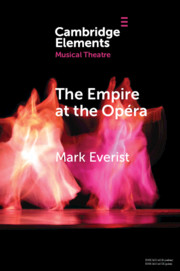Element contents
The Empire at the Opéra
Published online by Cambridge University Press: 14 January 2021
Summary
- Type
- Element
- Information
- Series: Elements in Musical TheatreOnline ISBN: 9781108909815Publisher: Cambridge University PressPrint publication: 21 January 2021
References
Primary Sources
Secondary Sources
- 6
- Cited by

